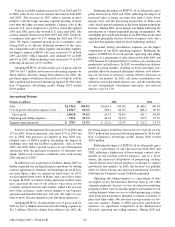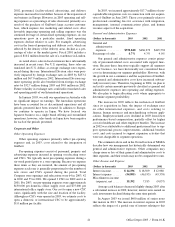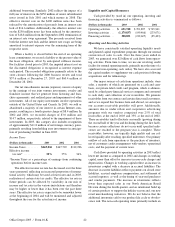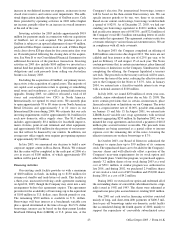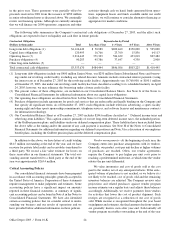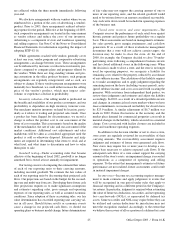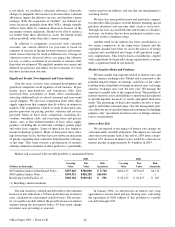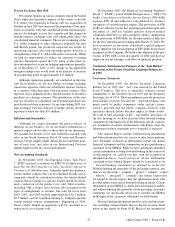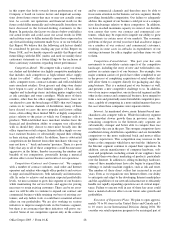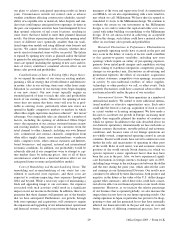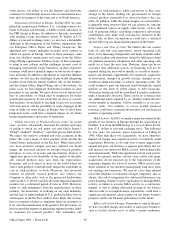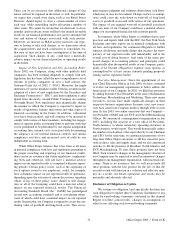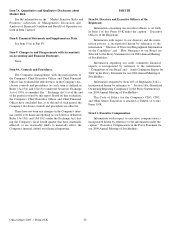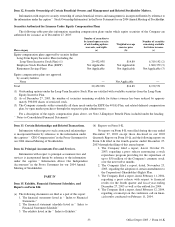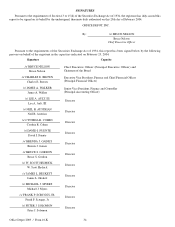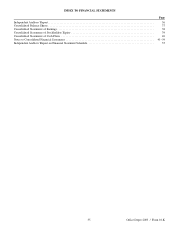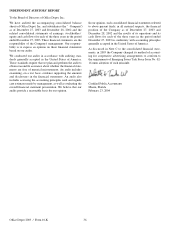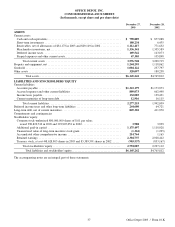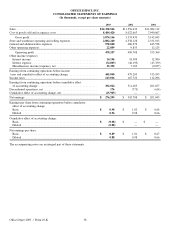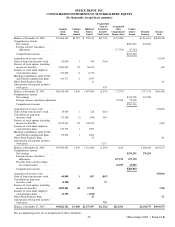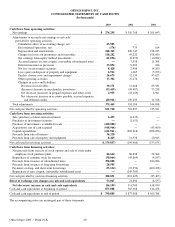Office Depot 2003 Annual Report Download - page 32
Download and view the complete annual report
Please find page 32 of the 2003 Office Depot annual report below. You can navigate through the pages in the report by either clicking on the pages listed below, or by using the keyword search tool below to find specific information within the annual report.other factors, our ability to use the Internet and electronic
commerce to substantially increase sales in international loca-
tions may not progress at the same rate as in North America.
Integration of Guilbert in Europe: In June 2003, we com-
pleted the acquisition of Guilbert, S.A., a leading contract sta-
tioner in Europe and formerly a wholly owned subsidiary of
the PPR Group in France. In addition to the risks associated
with making a large investment (nearly $1 billion in U.S.
dollars at year-end exchange rates), we also face a formidable
challenge in the integration of the Guilbert organization into
our European Office Depot and Viking businesses. We
appointed new country managers in nearly every country in
which we operate in Europe. Some of these managers came
from the Guilbert organization and some from the Office
Depot/Viking organization. Failures of any of these managers
to adapt to new cultures and the challenges in most cases of
managing substantially larger businesses in their respective
countries could have a material impact on our results of opera-
tions in Europe. In addition to the merger of somewhat different
cultures, we also face the challenges of physically integrating
facilities from both the former Guilbert side of the business
and the former Office Depot/Viking side of the business. In
many cases, we have duplicate distribution facilities in close
proximity to one another. We must choose wisely which facil-
ities to consolidate, or which ones to emphasize for future
growth and expansion. To the extent that we close or consoli-
date facilities, we are likely to face high social costs associated
with such moves, and the possibility of work stoppages in the
form of strikes in some locales in Europe. Any or all of these
integration issues could have a material impact on our future
financial performance and results of operations.
Global Sourcing of Products/Private Label: In recent
years, we have substantially increased the number and types
of products which we sell under our own Office Depot威,
Viking娃, Guilbert威,NiceDay娃and other private label brands.
We expect this trend to continue and even accelerate in the
future. We source many of these products from outside the
United States, particularly in the Far East. While these prod-
ucts have attractive margins and may enhance our brand
image, the increased reliance on foreign sourced products
introduces its own set of risks and uncertainties. Sources of
supply may prove to be unreliable, or the quality of the glob-
ally sourced products may vary from our expectations.
Economic and civil unrest in areas of the world where we
source such products could adversely impact the availability or
cost of such products, or both. Moreover, this increased
reliance on globally sourced products also subjects our
Company to other risks, such as the protracted dockworkers
strike on the U.S. West Coast that adversely impacted imported
products for a substantial period of time in 2002. Moreover,
while we seek indemnities from the manufacturers of these
products, the uncertainty of realizing on any such indemnity
and the lack of understanding of U.S. product liability laws in
certain parts of the Far East make it more likely that we may
have to respond to claims or complaints from our customers as
if we were the manufacturer of the products. For this reason, we
have incurred the expense of purchasing separate product liabil-
ity insurance for sourced products. The availability and
expense of such insurance, while satisfactory to date, may
change in the future, making our procurement of foreign
sourced products materially less attractive than is the case
today. In addition, while the initial margins on such products
is generally more attractive than we can achieve by sourcing
from traditional sources of supply, other factors, such as the
lack of program dollars, including cooperative advertising
contributions, may make such sourcing less attractive in the
future. Any of these circumstances could have a material
adverse effect on our financial performance in the future.
Sources and Uses of Cash: We believe that our current
level of cash and cash equivalents, future operating cash
flows, lease financing arrangements and funds available under
our credit facilities and term loans should be sufficient to fund
our planned expansion, integration and other operating cash
needs for at least the next year. However, there can be no
assurance that additional sources of financing will not be
required during the next twelve months as a result of unantic-
ipated cash demands, opportunities for expansion, acquisition
or investment, changes in growth strategy, changes in our
warehouse integration plans or adverse operating results. We
could attempt to meet our financial needs through the capital
markets in the form of either equity or debt financing.
Alternative financing will be considered if market conditions
make it financially attractive. There can be no assurance that
any additional funds required by us, whether within the next
twelve months or thereafter, will be available to us on satis-
factory terms. Our inability to access needed financial
resources could have a material adverse effect on our financial
position or operating results.
M&A Activity: In 2003, we made a major investment in the
growth of our business in Europe through the acquisition of
Guilbert, S.A. from the PPR Group, at a cost of almost $1 bil-
lion (U.S. dollars at year-end exchange rates). This followed
by five years our previous major acquisition of Viking in
1998. Other than these two acquisitions, we have otherwise
limited our merger and acquisition activity to relatively small
acquisitions. However, as we seek ways to more aggressively
expand and grow our business, it appears more likely that we
will increase our interest in M&A activity, both domestically
and internationally. While the opportunities from such activity
cannot be ignored, neither can the clear reality that many
acquisitions do not measure up to the expectations of the
acquiring company, for a host of reasons. M&A activity may
divert attention of our executive management team away from
our existing core businesses. We may do a less than optimal
job of due diligence or evaluation of target companies, and, as
always, the task of integrating two substantial businesses can
prove daunting. Failure to grow our businesses through M&A
activity, or failure to execute M&A activity in a satisfactory
manner, as well as adding substantial leverage to our balance
sheet in order to accomplish major acquisitions, could have a
significant and material adverse effect on our future business
prospects and/or our financial performance in the future.
Effects of Certain Charges: From time to time in the past,
we have recorded charges and credits to adjust past estimates,
such as facility closure costs, to reflect current conditions.
Office Depot 2003 / Form 10-K 30


